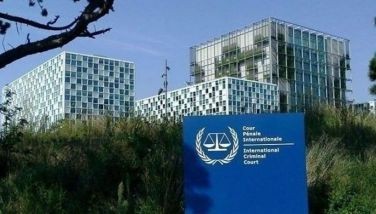Aquino, Japan PM push for freedom of navigation
TOKYO (via Smart/PLDT) – President Aquino and Japanese Prime Minister Shinzo Abe agreed yesterday to push for freedom of navigation and free passage through international airspace to promote peace and stability in the region.
The two leaders cited the closer ties between the Philippines and Japan and vowed greater cooperation.
“We reiterated our commitment to uphold the rule of law, to promote the peaceful settlement of disputes and to ensure freedom of flight in international airspace,†Aquino said.
Aquino said 2013 had been a banner year for high-level exchanges between the Philippines and Japan.
“Throughout the dialogues and discussions our two countries have had, we have always expressed a consistent desire to deepen our relations and to enhance our strategic partnership,†he said.
“We do this knowing that stronger engagement will benefit both the Japanese and the Filipino people, foster development, security and peace in our countries, and build a more peaceful and more secure Asia-Pacific region,†Aquino said.
“He reiterated the need for an ASEAN-centric, multilateral approach to conflict resolution, and that it is essential to maintain freedom of navigation in the vital sea lanes of the region,†Press Secretary Herminio Coloma Jr. said of Aquino’s message.
“He expressed the hope that with increased cooperation among ASEAN member countries and their dialogue partners, tensions will be reduced,†Coloma said.
For his part, Abe said he could feel that he and Aquino had developed stronger “personal trust in each other†over the last three summit meetings they had this year.
“Given the increasingly difficult regional security environment, I am willing to address regional and other international issues under much closer coordination with the President,†Abe said.
The Japanese leader visited Manila in July and the two leaders also had a bilateral meeting in Brunei Darussalam in October on the sidelines of the Association of Southeast Asian Nations leaders’ summit.
The Philippines has always expressed commitment to resolve disputes in the West Philippine Sea through peaceful means, without threat or use of force and through the application of international laws, particularly the United Nations Convention on the Law of the Sea (UNCLOS).
Manila also calls for strict observance by all stakeholders of the provisions of the Declaration on the Conduct of Parties in the South China Sea or West Philippine Sea (DOC). Manila is also calling for the adoption of a regional Code of Conduct in the South China Sea (COC).
During the 8th East Asia Summit in October in Brunei Darussalam, Abe stated that the issue of the West Philippine Sea was directly connected to the peace and stability in the region and was of common concern for the international community because of its impact on the global maritime order.
No unilateral move
Abe stressed that all parties concerned should not resort to changing the status quo unilaterally, and instead abide by relevant international laws including UNCLOS.
He also emphasized the importance of clarifying claims, adding that disputes must be resolved peacefully in accordance with international law.
The West Philippine Sea is being claimed wholly by China while the Philippines and other ASEAN countries are claiming parts of it.
The Department of Foreign Affairs, meanwhile, said that China’s air defense identification zone (ADIZ) compromises the safety of civil aviation.
While the East China Sea ADIZ does not affect Philippine territory at this time, China has announced that it “will establish other Air Defense Identification Zones at the right moment after necessary preparations are completed.â€
Officials said it could be anticipated that China could establish a similar zone over the West Philippine Sea in an effort to assert “control (over) the airspace (in the South China Sea).â€
On Nov. 24, the Japan Ministry of Foreign Affairs issued a statement expressing “deep concern about the establishment of the ADIZ and obliging its own rules within the zone, which are profoundly dangerous acts that unilaterally change the status quo in the East China Sea, escalating the situation, and that may cause unintended consequences in the East China Sea.â€
“Japan will continue to respond firmly but in a calm manner against China’s attempt to unilaterally alter the status quo by coercive measures with determination to defend resolutely its territorial land, sea and airspace,†it said.
Boosting coast guard
President Aquino and Abe also witnessed yesterday the signing of a $187-million (18.732 billion yen) loan for the Philippines’ acquisition of multi-role response vessels to boost the capability of its coast guard to conduct maritime patrols.
“Our enhanced partnership extends far beyond trading ties. As you know, the Philippines is a country of more than 7,000 islands, and the challenge is how to communicate with all our people and how to move them to where they must be, especially during times of disaster,†Aquino said as he and Abe appeared before the media after their working lunch at the Prime Minister’s official residence.
Aquino said the aftermath of Super Typhoon Yolanda had demonstrated the need for the country to have the capability to transport relief aid and disaster personnel to ravaged areas.
The P9.267-billion Maritime Safety Capability Improvement Project for the Philippine Coast Guard was approved by the National Economic and Development Authority Board on Nov. 29, 2012.
The Department of Transportation and Communications said the delivery of the vessels will begin in the fourth quarter of 2015 until October 2017.
Coloma said Japan’s technical assistance to the PCG includes, among others, asset acquisition and human resource development, maritime monitoring and surveillance and management of maritime traffic in critical areas.
Assistance is provided on a per project basis, with duration depending on the type of project.
The Japan International Cooperation Agency has also conceptualized a new training course in law enforcement operations as part of the multi-response vessels acquisition project.
The new training course involves four annual sessions and one major bilateral training session with a selected ASEAN country. The training will start in the first quarter of 2014 and end in the last quarter of 2016, Coloma said. – With Evelyn Macairan
- Latest
- Trending




























